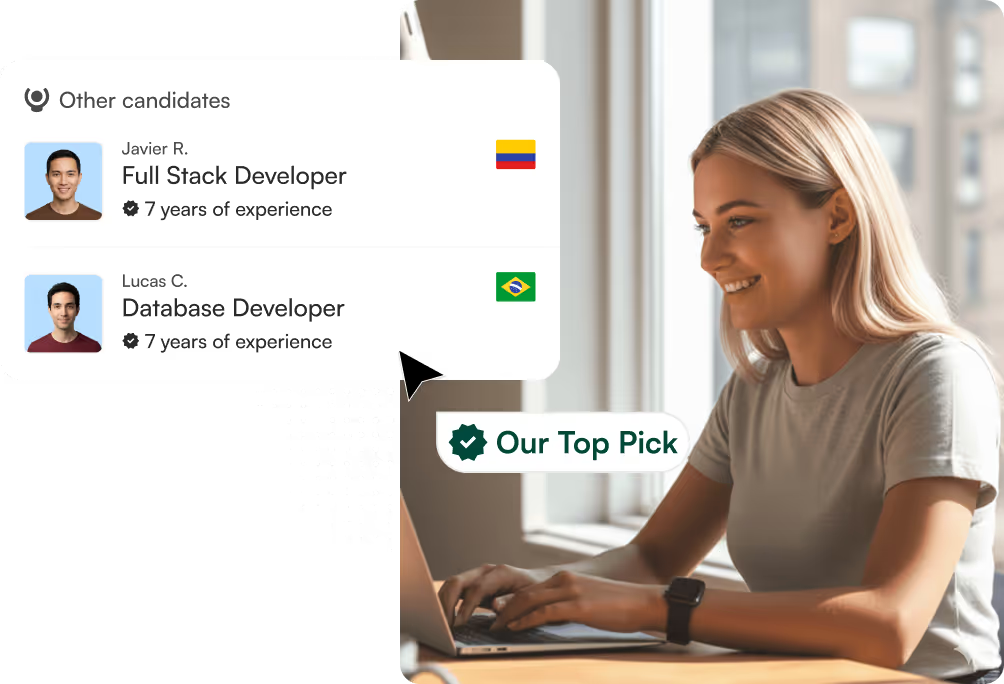75 Essential Culture Fit Interview Questions for Hiring Success


Lupa will help you hire top talent in Latin America.
Book a Free Consultation
Lupa helps you build, manage, and pay your remote team. We deliver pre-vetted candidates within a week!
Book a Free ConsultationIn today's competitive job market, finding candidates with the right skills is only half the battle. Equally important is finding individuals who align with your company culture and values. Culture fit interview questions help hiring managers assess whether a candidate will thrive within your organization's unique environment.
At Lupa, we understand that the right cultural alignment leads to higher employee engagement, better team collaboration, and lower turnover rates. However, there's a delicate balance between hiring for culture fit and maintaining diversity of thought and backgrounds.
Understanding Culture Fit in the Hiring Process
Culture fit refers to how well a candidate's values, behaviors, and work preferences align with your organization's culture. It's about finding people who will thrive in your work environment while contributing positively to your team dynamics.
However, it's important to distinguish between "culture fit" and "culture add." While culture fit focuses on how well a candidate matches your existing culture, culture add considers how a candidate might enhance your culture by bringing new perspectives and experiences.
Research consistently shows that good cultural alignment delivers tangible benefits:
- Companies with strong cultures see 72% higher employee engagement rates
- Cultural alignment can reduce turnover by up to 50%
- Teams with strong cultural cohesion report 33% higher productivity
Despite these benefits, overemphasizing culture fit can lead to homogeneity and lack of diversity. When everyone thinks and acts the same way, innovation suffers. The key is to focus on alignment with core values while welcoming diverse perspectives and backgrounds.
Preparing to Assess Cultural Fit
Before diving into culture fit interview questions, proper preparation is essential:
- Define your culture clearly: Document your company's core values, mission, and the behaviors that demonstrate those values. What makes your workplace unique? What traits do your most successful employees share?
- Create an objective assessment framework: Develop criteria for evaluating cultural alignment based on your defined values, not subjective feelings or personal preferences.
- Train your interviewers: Ensure everyone involved in the hiring process understands how to assess cultural fit consistently and without bias.
- Incorporate cultural assessment throughout the interview process: Rather than having a single "culture interview," weave cultural assessment throughout multiple interactions.
- Involve diverse team members: Include people from different backgrounds and departments in the interview process to get varied perspectives on cultural alignment.
By preparing thoroughly, you can create a more objective and effective process for assessing cultural fit during interviews.
75 Culture Fit Interview Questions by Category
1. Questions About Motivation and Work Excitement
These culture fit interview questions help assess what drives candidates and what aspects of work they find most fulfilling:
- "What aspects of your current/previous job do you find most energizing?" Listen for: Alignment between what energizes them and what your role offers.
- "Describe a project that got you excited to come to work every day. What made it so engaging?" Listen for: Whether they're motivated by factors present in your work environment.
- "What keeps you engaged during repetitive or routine tasks?" Listen for: Self-motivation strategies and resilience.
- "How do you stay motivated when facing significant challenges or setbacks?" Listen for: Resilience, problem-solving approach, and intrinsic motivation.
- "What type of recognition or feedback helps you feel most appreciated?" Listen for: Whether their preferences align with your company's feedback style.
- "What are you looking for in your next role that you're not getting now?" Listen for: Whether your position can satisfy their key motivators.
- "What kind of work environment brings out your best performance?" Listen for: Alignment with your actual work environment.
- "What mission or purpose would make you excited to join a company?" Listen for: Values alignment with your organization's mission.
2. Questions About Self-awareness and Personal Growth
These questions assess a candidate's level of self-awareness and commitment to development:
- "What's one professional skill you've developed significantly in the past year?" Listen for: Commitment to continuous learning and self-improvement.
- "How do you typically respond to constructive criticism?" Listen for: Openness to feedback and growth mindset.
- "What's one area where you're currently focusing your professional development efforts?" Listen for: Self-awareness and proactive approach to growth.
- "Tell me about a time when you received feedback that was difficult to hear. How did you respond?" Listen for: Ability to process challenging feedback constructively.
- "How would your colleagues describe your strengths and areas for improvement?" Listen for: Self-awareness and honesty about development areas.
- "What's something you've learned about yourself in the past year that surprised you?" Listen for: Reflectiveness and personal insight.
- "How do you identify areas where you need to develop new skills?" Listen for: Proactive approach to professional development.
- "What strategies do you use to adapt to new situations or environments?" Listen for: Adaptability and self-management techniques.
- "How have you applied feedback from a manager to improve your performance?" Listen for: Ability to translate feedback into action.
3. Questions About Professional Goals and Business Insight
These questions explore candidates' career aspirations and business understanding:
- "Where do you see your career in 3-5 years?" Listen for: Whether their goals align with growth opportunities at your company.
- "What do you consider the most important factors for success in this industry?" Listen for: Industry knowledge and alignment with your company's approach.
- "How do you stay informed about trends and developments in your field?" Listen for: Commitment to ongoing learning and industry awareness.
- "What attracted you to this industry/sector?" Listen for: Genuine interest and alignment with your company's purpose.
- "How do you define success in your current role?" Listen for: Whether their definition of success aligns with your expectations.
- "What business metrics do you pay most attention to in your current role?" Listen for: Business acumen and results orientation.
- "How do you balance quality and efficiency in your work?" Listen for: Alignment with your company's approach to quality and productivity.
- "What aspects of our business model or company strategy interest you most?" Listen for: Research they've done and genuine interest in your company.
- "How do you see your role contributing to broader business objectives?" Listen for: Understanding of how their work connects to organizational goals.
4. Questions About Communication and Collaboration
These culture fit interview questions assess how candidates interact with others:
- "Describe your communication style. How do you adapt it when working with different people?" Listen for: Self-awareness and flexibility in communication.
- "Tell me about a successful collaboration you've been part of. What made it work well?" Listen for: Teamwork skills and what they value in collaborative environments.
- "How do you handle disagreements with colleagues?" Listen for: Conflict resolution skills and respect for different perspectives.
- "What role do you typically play in team projects?" Listen for: Self-awareness about team dynamics and contribution style.
- "How do you ensure your ideas are heard in group settings?" Listen for: Communication skills and assertiveness balanced with respect.
- "Describe a situation where you had to explain a complex concept to someone. How did you approach it?" Listen for: Communication clarity and adaptability.
- "How do you build relationships with new team members?" Listen for: Interpersonal skills and approach to team integration.
- "What's your approach to giving feedback to peers?" Listen for: Communication style and sensitivity to others.
- "How do you prefer to receive updates and information from your manager and team?" Listen for: Communication preferences and whether they align with your style.
5. Questions About Company Values and Alignment
These questions directly assess alignment with your specific values:
- "What do you know about our company culture, and what aspects resonate with you?" Listen for: Research they've done and genuine connection to your values.
- "Which of our company values resonates with you most, and why?" Listen for: Authentic connection to your core values.
- "Tell me about a time when you've demonstrated [specific company value] in your work." Listen for: Evidence they've lived values similar to yours.
- "What type of company culture brings out your best work?" Listen for: Alignment with your actual culture.
- "How would you contribute to our company culture?" Listen for: What they would add to your environment.
- "Describe a company value from a previous employer that you strongly connected with." Listen for: Values alignment and how they embody values at work.
- "What aspects of a company's mission are most important to you?" Listen for: Alignment with your mission and purpose.
- "How do you evaluate whether a company's values align with your own?" Listen for: Thoughtfulness about values and cultural fit.
- "What would you do if you were asked to complete a task that conflicted with your personal values?" Listen for: Integrity and approach to ethical dilemmas.
6. Questions About Work-Life Balance and Stress Management
These questions explore candidates' approaches to sustainability and wellbeing:
- "How do you maintain work-life balance in demanding periods?" Listen for: Sustainable approach to work and self-care.
- "Describe how you manage competing priorities when everything seems urgent." Listen for: Prioritization skills and stress management.
- "What strategies do you use to stay focused and productive during busy times?" Listen for: Work style and stress management techniques.
- "How do you recharge after intense work periods?" Listen for: Self-awareness and sustainable approach to work.
- "Tell me about a time when you had to manage tight deadlines. How did you handle it?" Listen for: Approach to pressure and time management.
- "What boundaries do you set to ensure you can perform at your best consistently?" Listen for: Self-management and sustainability.
- "How do you recognize when you're approaching burnout, and what do you do about it?" Listen for: Self-awareness and proactive wellbeing management.
- "What does an ideal work schedule look like for you?" Listen for: Alignment with your company's expectations around hours and flexibility.
- "How do you communicate when you're feeling overwhelmed with work?" Listen for: Communication style around workload and needs.
7. Questions About Leadership and Management Style
These culture fit interview questions assess preferences regarding leadership:
- "Describe your ideal manager. What management style brings out your best work?" Listen for: Alignment with your company's leadership approach.
- "How do you prefer to receive feedback and direction?" Listen for: Communication preferences and receptiveness to guidance.
- "Tell me about the best manager you've had. What made them effective?" Listen for: What they value in leadership.
- "How do you approach leading a team or project?" Listen for: Leadership style and alignment with your company's approach.
- "What's your approach to delegating tasks and responsibilities?" Listen for: Trust, empowerment, and control balance.
- "How do you motivate team members who are struggling with engagement?" Listen for: Leadership skills and empathy.
- "How do you ensure team members feel heard and valued?" Listen for: Inclusive leadership approach.
- "What's your approach to developing the skills of people you manage?" Listen for: Investment in others' growth and development style.
- "How do you handle situations where you disagree with a decision from senior leadership?" Listen for: Respect, constructive approach, and alignment.
8. Questions About Learning Style and Decision Making
These questions explore how candidates learn and make decisions:
- "How do you prefer to learn new skills or information?" Listen for: Learning style and whether it fits your training approach.
- "Describe your decision-making process when facing a complex problem." Listen for: Analytical skills, thoroughness, and approach.
- "How do you balance data with intuition when making decisions?" Listen for: Decision-making style and alignment with your company's approach.
- "Tell me about a time when you had to make a decision with incomplete information." Listen for: Comfort with ambiguity and pragmatic approach.
- "How do you approach decisions that affect other team members?" Listen for: Collaborative approach and consideration of others.
- "What resources do you typically use when learning something new?" Listen for: Self-directed learning and resourcefulness.
- "How do you evaluate whether a decision you made was successful?" Listen for: Reflection, metrics focus, and learning orientation.
- "Describe a situation where you had to quickly become knowledgeable about a new topic or tool." Listen for: Adaptability and learning agility.
- "How do you approach decisions where there are multiple good options?" Listen for: Discernment and prioritization approach.
Interpreting Responses to Culture Fit Questions
When evaluating candidates' responses to culture fit interview questions, consider these guidelines:
- Look for authentic alignment, not perfect matches: The goal isn't to find someone identical to your current team but someone who shares core values while bringing their unique perspective.
- Distinguish between genuine alignment and rehearsed answers: Many candidates research common culture fit questions. Look for specific examples and personal stories that demonstrate authentic alignment.
- Consider context and growth: A candidate might not have had the opportunity to demonstrate certain values in previous roles but could show potential for growth and adaptation.
- Watch for red flags: Responses that indicate values misalignment, poor teamwork, inability to handle feedback, or lack of self-awareness may predict future challenges.
- Document consistently: Use a structured evaluation form to assess cultural alignment consistently across candidates.
- Compare notes with other interviewers: Different perspectives can help identify patterns and reduce individual bias.
- Weigh cultural fit appropriately: Cultural alignment is important but should be balanced with skills, experience, and potential.
Remember that the goal is to build a team that shares core values while bringing diverse perspectives, experiences, and approaches.
Balancing Culture Fit with Diversity and Inclusion
While assessing cultural fit is important, it shouldn't come at the expense of diversity and inclusion. Here's how to strike the right balance:
- Focus on values alignment, not personality matching: Assess whether candidates share your core values, not whether they're similar to existing team members in background, interests, or style.
- Embrace "culture add" over "culture fit": Look for candidates who will not only thrive in your culture but also enhance it by bringing new perspectives and experiences.
- Standardize your assessment process: Use consistent criteria and questions for all candidates to reduce the influence of unconscious bias.
- Involve diverse interviewers: Include people from different backgrounds, departments, and levels in your interview process to get varied perspectives.
- Regularly audit your culture fit criteria: Review your assessment criteria to ensure they don't inadvertently favor certain backgrounds or experiences.
- Separate cultural values from cultural norms: Distinguish between fundamental values (like integrity, respect, excellence) and cultural norms (like communication style, social activities) that may be influenced by background.
- Value cognitive diversity: Recognize that different thinking styles and approaches can strengthen your team's problem-solving and innovation.
By focusing on core values alignment while welcoming diverse perspectives and backgrounds, you can build a cohesive yet diverse team that drives innovation and performance.
Implementing Culture Fit Questions in Different Interview Formats
Culture fit interview questions can be incorporated into various interview formats:
One-on-One Interviews
- Include 3-5 culture fit questions in each interview
- Allow time for follow-up questions to explore responses deeply
- Consider having different interviewers focus on different cultural dimensions
Panel Interviews
- Assign specific culture-related questions to different panel members
- Use the diverse perspectives of panel members to assess cultural alignment from multiple angles
- Debrief together to compare observations and impressions
Behavioral Interviews
- Frame culture fit questions in the "Tell me about a time when..." format
- Look for specific examples that demonstrate alignment with your values
- Use the STAR method (Situation, Task, Action, Result) to evaluate responses
Virtual Interviews
- Pay attention to communication style and engagement in the virtual format
- Consider how candidates adapt to the technology and format
- Include questions about remote work preferences and self-management if relevant
Case Studies or Work Simulations
- Observe how candidates approach problems and interact with others during simulations
- Look for behaviors that demonstrate your core values in action
- Provide opportunities for collaboration to assess teamwork and communication
Regardless of format, ensure that your interview process includes multiple touchpoints for assessing cultural alignment, and train all interviewers on how to evaluate responses consistently.
Conclusion
Culture fit interview questions are powerful tools for assessing whether candidates will thrive in your organization while contributing positively to your team. By focusing on values alignment rather than personality matching, you can build cohesive teams without sacrificing diversity of thought and background.
Remember that these 75 culture fit interview questions are starting points to be adapted to your specific organizational culture and values. There are no universally "right" or "wrong" answers—what matters is alignment with your particular environment and needs.
The most effective approach to cultural assessment combines structured questions with thoughtful evaluation, involving diverse perspectives in the process. By balancing cultural alignment with skills, experience, and potential, you can build strong, innovative teams that drive your organization forward.
Ultimately, finding candidates who both fit and enhance your culture is key to building high-performing teams that can adapt and thrive in today's rapidly changing business environment.
Ready to Transform Your Hiring Process with Cultural Intelligence?
Finding candidates who truly align with your company culture while bringing fresh perspectives can be challenging. At Lupa, we specialize in identifying premium talent that fits your unique organizational values and work environment.
Our deep understanding of cultural nuances and premium match quality ensures you don't just get candidates who check technical boxes—you get professionals who will thrive in your team's specific culture while adding valuable new perspectives.
Unlike traditional recruiters focused on volume or speed, Lupa takes a strategic, consultative approach to each placement, ensuring cultural alignment that leads to higher retention, engagement, and performance.
Book a discovery call today to learn how our human-centered, values-driven hiring approach can help you build cohesive, diverse teams that drive innovation and results.
Frequently Asked Questions
How do you pass a culture fit interview?
Research the work culture thoroughly using LinkedIn, company websites, and employee reviews to understand their values and corporate culture. During the job interview, demonstrate how your work ethic aligns with their environment through specific examples that show initiative and open communication.
Be authentic rather than using a generic template approach. Share real stories that illustrate your ability to be a team player and contribute to team-building efforts. Companies seek a strong culture fit who will enhance their workplace culture, not just fill a role.
What are culture fit questions?
Culture fit questions explore how job candidates align with company values and work culture. Common types of questions include:
- "How do you handle conflict with team members?"
- "Describe your ideal work environment"
- "What motivates you beyond compensation?"
- "Tell me about a time you showed initiative"
- "How do you contribute to team-building?"
Human resources teams ask these questions to assess whether new hires will thrive in their specific workplace culture. Sample answers should reflect genuine experiences that demonstrate open communication, collaboration, and alignment with the company's goals.
What is an example of a cultural fit?
A good cultural fit occurs when your values and work ethic align with the company's environment. For example, if a company values real-time collaboration and open communication, demonstrating your experience leading cross-functional projects shows you're the right fit.
Another example: if they prioritize initiative and autonomous work culture, sharing how you identified and solved problems independently illustrates compatibility. The key is showing how your approach naturally supports their corporate culture and company's goals rather than forcing artificial alignment.
What are the 5 best questions to ask an interviewer?
Strategic questions demonstrate your interest in finding the right fit for your dream job while assessing if this opportunity supports your job satisfaction:
- "How would you describe the work culture here, and what makes someone successful?"
- "What are the company's goals for the next year, and how does this role contribute?"
- "How does the team approach open communication and collaboration?"
- "What does onboarding look like for new hires in this position?"
- "What would make you excited to extend a job offer to the right candidate?"

"Over the course of 2024, we successfully hired 9 exceptional team members through Lupa, spanning mid-level to senior roles. The quality of talent has been outstanding, and we’ve been able to achieve payroll cost savings while bringing great professionals onto our team. We're very happy with the consultation and attention they've provided us."


“We needed to scale a new team quickly - with top talent. Lupa helped us build a great process, delivered great candidates quickly, and had impeccable service”


“With Lupa, we rebuilt our entire tech team in less than a month. We’re spending half as much on talent. Ten out of ten”






















